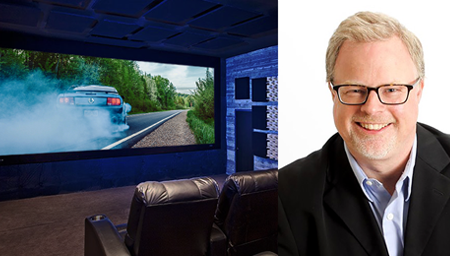related articles
“I can either be straight with my clients or take more of a middle-market approach and become like McDonald’s and say, ‘Sure, I’ll take your order!'”
Sign up for our monthly newsletter
to stay up to date on Cineluxe
High-end home entertainment projects aren’t immune from supply issues—planning well ahead is the key
by the Cineluxe Staff
June 22, 2022
Todd Anthony Puma of New York City-area The Source Home Theater creates home entertainment spaces and smart homes for wealthy clients in the New York metro area, the surrounding suburbs, the Hamptons, and beyond. The systems he creates run the gamut in capabilities and complexity, and the spaces he works with range from Manhattan apartments to New Jersey estates to South Fork summer homes. One thing all his work has had in common lately is nimbly negotiating supply-chain issues. Yes, people have experienced inconveniences in every imaginable situation from a multitude of pipelines suddenly drying up, but the absence of a crucial widget in a smart home can mean the homeowners can’t move in when they planned—sometimes for months.
Todd is known for being both direct and practical in his observations, and that proves to be especially true with his thoughts below on the current state of the home-tech supply chain and the likely future.
I would imagine that supply-chain issues probably come up with every project you’re doing. How do you prepare a client for that?
The conversation I have with clients who are contemplating a project is, “Listen we need to purchase all of the product now and have it in the queue so when the job does starts, we have everything we need. You might be wanting to move into your home in four months but if we wait until closer to the start date to order, receiving product could be seven months out.”
That’s an uncomfortable conversation to have, but it’s definitely one we’re having. And many of them are buying all the product, even if their project is a year and a half out, because they understand the situation. They get that it’s not just something we’re saying to make a sale.
It’s got to be difficult telling someone the rules have changed and things are a lot different now than they were just a year ago.
I think it’s important to be genuine with a client, and also to prove your facts. I will tell them, “Here are the products we’re talking about ordering. The manufacturers’ lead times for them are weeks and months out, etc.” Doing that makes them feel more secure and comfortable about pre-ordering.
They have to trust you in a situation like this. If they don’t feel like they can trust you, they’re not going to work with you long. And trust is key because this a lot like a marriage. We’re the first people in on a project and the last ones out. The cleaning ladies don’t talk to the clients as much as we do.
Do wealthy clients understand that, in the current situation, throwing additional money at the problem isn’t going to help speed things up?
I think our clients—the one percenters—are actually more likely to get it than other people. They’re dealing with money all the time and, from their work, they see the impact supply-chain issues are having on their dollars and cents. It’s having an impact on everything around them.
It’s harder for the integrators who are dealing more with the middle market to convince their clients, because their clients will say, “Can’t we just do Amazon all around the house?” Or, “I just want Neeo,” or, “I just want Sonos.” They just want whatever’s ready and readily available.
So I can either try to be straight with my clients or I can take more of a middle-market approach and become like McDonald’s and say, “Sure, I’ll take your order! What else would you like with that? Would you like HDMI cables? Audio cables? Fantastic. I’ll add that to your order as well. Would you like to super-size your system and have whole-house integration or lighting control?”
Isn’t that a case of the middle-market guys doing whatever they have to to get by until all this blows over?
I understand that those firms have to approach jobs that way so they don’t go out of business and end up working for someone else. But, to be honest, I don’t think this situation is ever going to end. I think this is going to become the new standard for us, and this is a teachable moment for businesses to understand that they have to have the working capital in order to plan—not to operate from job to job, but to plan for two years’ worth of disposable income in order to reinvent in their company.
Todd Anthony Puma is the founder and CEO of The Source Home Theater, based in Matawan, NJ and serving the greater New York Metro area.
“Many of our clients are buying all the product now, even if their project is a year and a half out. They get that it’s not just something we’re saying to make a sale.”
“Our clients—the one percenters—are more likely to get this than other people. They’re dealing with money all the time and can see the impact supply-chain issues are having on their dollars and cents”
© 2023 Cineluxe LLC





